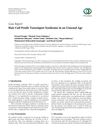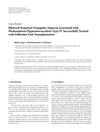 19 citations,
June 2020 in “Animals”
19 citations,
June 2020 in “Animals” Poor maternal nutrition can lead to fewer wool follicles in Chinese Merino sheep.
33 citations,
March 2018 in “Trends in cell biology” Metabolism plays a key role in determining stem cell fate.
[object Object]  61 citations,
January 2019 in “American Journal of Clinical Dermatology”
61 citations,
January 2019 in “American Journal of Clinical Dermatology” The cause of Frontal Fibrosing Alopecia is unclear, diagnosis involves clinical evaluation and various treatments exist, but their effectiveness is uncertain.
 4 citations,
January 2015 in “Case reports in urology”
4 citations,
January 2015 in “Case reports in urology” An 8-year-old boy recovered from a rare case of penile tourniquet syndrome after hair removal surgery.
 1 citations,
September 2023 in “Acta dermato-venereologica”
1 citations,
September 2023 in “Acta dermato-venereologica” Certain genetic variants are linked to frontal fibrosing alopecia in Spanish patients.
 February 2014 in “Medicine - Programa De Formación Médica Continuada Acreditado”
February 2014 in “Medicine - Programa De Formación Médica Continuada Acreditado” The document concludes that non-scarring alopecias can be reversed, but scarring alopecias cause permanent hair loss.
 106 citations,
April 2010 in “ACS Nano”
106 citations,
April 2010 in “ACS Nano” C60 fullerenes can alter protein function and may help develop new disease inhibitors.
5 citations,
September 2021 in “Clinical case reports” GLPLS is a rare skin condition with specific hair loss and skin symptoms.
 152 citations,
December 2007 in “Gender Medicine”
152 citations,
December 2007 in “Gender Medicine” Male and female skin differ due to hormones, affecting conditions like hair loss, acne, and skin cancer, and suggesting a need for gender-specific treatments.
 January 2023 in “Applied sciences”
January 2023 in “Applied sciences” Gefitinib and Sasam-Kyeongokgo together significantly reduce cancer growth and improve immune response in mice.
 August 2021 in “Research Square (Research Square)”
August 2021 in “Research Square (Research Square)” Borneol Essential Oil could be a natural and safe acne treatment.
 86 citations,
August 2011 in “Toxicological sciences”
86 citations,
August 2011 in “Toxicological sciences” TCDD speeds up skin barrier formation by increasing certain gene expressions.

PCOS has a strong genetic basis, but more research is needed to fully understand it.
 9 citations,
March 2013 in “ISRN Stem Cells (Online)”
9 citations,
March 2013 in “ISRN Stem Cells (Online)” Skin stem cells were turned into heart cells using a chemical, suggesting a new way to treat heart attacks.
31 citations,
July 2021 in “ImmunoTargets and therapy” Alopecia areata is an incurable autoimmune condition causing hair loss, with research aiming for better treatments.
 5 citations,
February 2019 in “BioMed Research International”
5 citations,
February 2019 in “BioMed Research International” Acne in reproductive-age women may be linked to conditions like PCOS and lifestyle factors, so doctors should check for these when treating acne.
 1 citations,
November 2022 in “Frontiers in medicine”
1 citations,
November 2022 in “Frontiers in medicine” The study found that giant pandas have more melanin in black hair follicles than white, with gene expression differences that could affect hair color and skin health.
[object Object]  18 citations,
September 2015 in “Clinical Endocrinology”
18 citations,
September 2015 in “Clinical Endocrinology” Women with PCOS have higher levels of a certain growth factor, which can be reduced by taking metformin.
 February 2018 in “Trends in Immunology”
February 2018 in “Trends in Immunology” Skin bacteria can help wound healing by activating certain immune cells.
1 citations,
November 2023 in “Life” Hyaluronic acid injections can improve mouth opening and quality of life in scleroderma patients.
1 citations,
May 2024 in “Applied Sciences” Cordyceps militaris is a promising, cost-effective medicinal fungus with health benefits and efficient production methods.
 January 2022 in “Stem cell biology and regenerative medicine”
January 2022 in “Stem cell biology and regenerative medicine” The document concludes that hair follicle regeneration involves various factors like stem cells, noncoding dsRNA, lymphatic vessels, growth factors, minoxidil, exosomes, and induced pluripotent stem cells.
 45 citations,
August 2018 in “Stem Cells International”
45 citations,
August 2018 in “Stem Cells International” Stem cells, especially from fat tissue and Wharton's jelly, can potentially regenerate hair follicles and treat hair loss, but more research is needed to perfect the treatment.
 73 citations,
August 2011 in “Stem Cell Research”
73 citations,
August 2011 in “Stem Cell Research” Human hair follicle stem cells can turn into multiple cell types but lose some of this ability after being grown in the lab for a long time.
 10 citations,
January 2011 in “Case reports in dermatological medicine”
10 citations,
January 2011 in “Case reports in dermatological medicine” Hair transplant surgery effectively treated a specific type of hair loss and is recommended as a primary treatment option.
 2 citations,
April 2022 in “Clinical, cosmetic and investigational dermatology”
2 citations,
April 2022 in “Clinical, cosmetic and investigational dermatology” A new plant-based treatment was effective for hair regrowth in women with a specific type of hair loss that didn't respond to usual treatments.
 1 citations,
September 2013 in “Elsevier eBooks”
1 citations,
September 2013 in “Elsevier eBooks” Hair ages and thins due to factors like inflammation and stress, and treatments like antioxidants and hormones might improve hair health.
 26 citations,
May 2012 in “Cellular and Molecular Life Sciences”
26 citations,
May 2012 in “Cellular and Molecular Life Sciences” NcoA4 may have roles beyond helping control gene activity, possibly affecting cell behavior and stability.
 77 citations,
July 2020 in “Journal of the European Academy of Dermatology and Venereology”
77 citations,
July 2020 in “Journal of the European Academy of Dermatology and Venereology” Environmental factors, hormones, nutrition, and stress all significantly affect skin health and aging.
 45 citations,
April 2019 in “International Immunology”
45 citations,
April 2019 in “International Immunology” The study concluded that immune cells attacking hair follicles cause hair loss in alopecia, with genetics and environment also playing a role, and highlighted the potential of certain treatments.

























